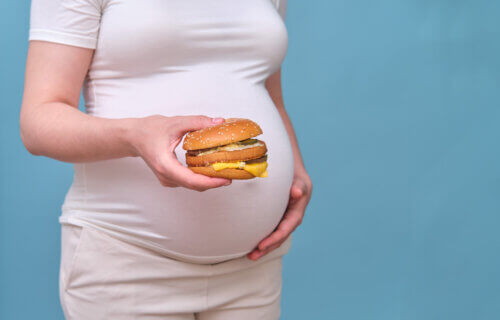SEATTLE — While it’s probably a good idea for everyone to cut back on fast food and ultra-processed snacks, researchers from the University of Washington explain that pregnant women should be especially determined to stick to a healthy diet. The reasoning behind that recommendation, however, will likely surprise many people. It isn’t about the actual nutritional content (or lack thereof) of these foods but what they come in contact with before they reach our lips. Specifically, scientists are talking about their packaging.
The team reports that phthalates, a class of chemicals associated with plastics, can actually seep out of food wrappings, packaging, and even the plastic gloves worn by store handlers. Even worse, over the course of the study, the consumption of fast food and ultra-processed foods showed an association with higher levels of phthalates among pregnant women specifically.
When consumed by a pregnant woman, those chemicals can enter the bloodstream, pass through the placenta, and enter the fetal bloodstream. Study authors explain that when this occurs, the chemical can incite oxidative stress and an inflammatory cascade within the fetus. Prior studies have found that exposure to phthalates during pregnancy can increase the risk of low birth weight and preterm birth, as well as child mental health disorders like autism and ADHD.
This project is the first ever among pregnant women specifically to show that diets featuring more ultra-processed foods correlate with more phthalate exposure.
“When moms are exposed to this chemical, it can cross the placenta and go into fetal circulation,” says senior author Dr. Sheela Sathyanarayana, a UW Medicine pediatrician and researcher at the Seattle Children’s Research Institute, in a media release.

This study features data provided by the Conditions Affecting Neurocognitive Development and Learning in Early Childhood (CANDLE) research cohort, encompassing 1,031 pregnant individuals living in Memphis, Tennessee, enrolled between 2006 and 2011. Meanwhile, researchers used urine samples collected during the second trimester of pregnancy to measure phthalate levels.
This led to the finding that ultra-processed foods comprised 10 to 60 percent of participants’ diets (38.6% on average). Every 10 percent increase in the dietary proportion of ultra-processed foods correlated with a 13-percent higher concentration of di(2-ethylhexyl) phthalate, considered one of the most common and harmful phthalates. Study authors derived phthalate amounts using urine samples taken from participating women.
Ultra-processed foods include substances extracted from less processed foods (oils, sugar, starch). Still, these goods change so mightily due to processing and adding chemicals and preservatives intended to enhance the appearance or shelf life that they are hard to recognize from their original states. Examples include packaged cake mixes, packaged french fries, hamburger buns, and soft drinks.
Regarding fast food specifically, gloves used by employees, as well as storage and preparation practices and serving equipment or tools all qualify as potential main sources of exposure. Both frozen and fresh ingredients are subject to exposure to these sources, adds lead study author Brennan Baker, a postdoctoral researcher in Sathyanarayana’s lab.
This is the first study, researchers say, to identify ultra-processed foods as a link between exposure to phthalates and the socioeconomic issues facing certain mothers. The vulnerability may stem from experiencing financial hardships and from living in “food deserts” in which healthier, fresh foods are harder to obtain and transportation to farther, healthier markets are unrealistic.
“We don’t blame the pregnant person here,” Baker comments. “We need to call out manufacturers and legislators to offer replacements, and ones that may not be even more harmful.”
More legislation is necessary, study authors posit, to prevent phthalate contamination in foods via the increased regulation of the composition of food wrapping and even the gloves that food handlers use.
What should pregnant women do today? Dr. Sathyanarayana suggests pregnant women do their best to avoid ultra-processed food as much as possible. Instead, opt for fruits, vegetables, and lean meats. Reading labels helps tremendously, she adds.
“Look for the lower number of ingredients and make sure you can understand the ingredients,” she concludes.
That even applies to “healthy foods” like breakfast bars. Always check the label to see if a food good has been sweetened with dates or contains tons of fats and sugars, Sathyanarayana stresses.
The study is published in the journal Environment International.



